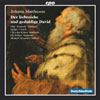Mattheson (Der) Liebreiche
A newly unearthed oratorio by Handel’s contemporary is an enjoyable discovery
View record and artist detailsRecord and Artist Details
Label: CPO
Magazine Review Date: 11/2009
Media Format: CD or Download
Media Runtime: 0
Catalogue Number: CPO777 360-2

Author: David Vickers
American conductor Michael Alexander Willens and his Cologne Academy give a good account of the oratorio. The group of eight singers deliver both choral and solo passages to a good standard. Nicki Kennedy has a fairly fast vibrato but is in bright voice as the allegorical figure Meditatio; her rousing aria “Der Loder der Tugend” (with horns) is a highlight. Christian Hilz seems ill at ease with David’s demanding melismatic phrases, but does a noble job of the lament “Ach Absalom mein Sohn!” (accompanied only by a theorbo, as if to evoke David’s harp; one wonders if this was really Mattheson’s intention). The other soloists are less prominent but routinely efficient. This performance contains some vivid theatrical flourishes (such as the Vivaldian ritornello that opens Part 2). Two booklet-notes by different authors take a while to digest, but those keen on exploring the byways of late-Baroque German repertoire will find this disc fascinating and enjoyable.
Discover the world's largest classical music catalogue with Presto Music.

Gramophone Digital Club
- Digital Edition
- Digital Archive
- Reviews Database
- Full website access
From £8.75 / month
Subscribe
Gramophone Full Club
- Print Edition
- Digital Edition
- Digital Archive
- Reviews Database
- Full website access
From £11.00 / month
Subscribe
If you are a library, university or other organisation that would be interested in an institutional subscription to Gramophone please click here for further information.




